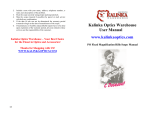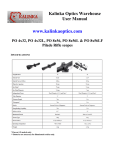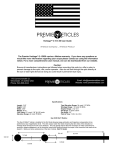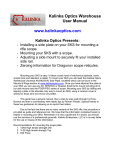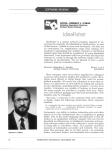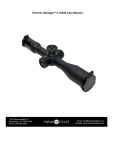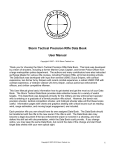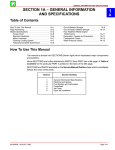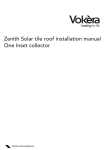Download Kalinka Optics Warehouse User Manual
Transcript
Kalinka Optics Warehouse User Manual www.kalinkaoptics.com Kalinka Optics PPO F & FS Zoom Military Series® Scopes with Dual Independent Focus and Diopiter, and Illuminated Military Rangefinding Reticles The following military-issue zoom rifle scopes are produced by Kalinka Optics on a limited basis. All scopes are hand made, hand assembled with hand-crafted reticles. Not all versions are available on a continuous basis, largely depending on military orders. • • • • • • • Kalinka Optics PPO 3-12x36 FS Military Series Rifle Scope w/ Illuminated Reticle Kalinka Optics PPO 5-15x50 F Military Series Rifle Scope Kalinka Optics PPO 5-15x50 FS Military Series Rifle Scope w/ Illuminated Reticle Kalinka Optics PPO 5-20x50 F Military Series Rifle Scope Kalinka Optics PPO 5-20x50 FS Military Series Rifle Scope w/ Illuminated Reticle Kalinka Optics PPO 5-20x50 YS Military Series Rifle Scope w/ Illuminated Reticle Kalinka Optics PPO 6-24x60 F Military Series Rifle Scope Additionally, the following fixed-power military-issue scopes are available: • • Kalinka Optics PPO 6x40 S Military Series Rifle Scope w/ Illuminated Reticle Kalinka Optics PPO 10x50 S Military Series Rifle Scope w/ Illuminated Reticle The Kalinka Optics Military Series® w/ Long Range Capabilities, Dual Focusing Systems w/ Parallax Elimination, and Illuminated Range-finding Reticles is one of the finest military scopes available. A pancreatic scope with smooth adjusting magnification it is used by a variety of military units in Russia and the CIS. Certain models are also used by snipers in Special Forces units in two European countries. The Kalinka PPO series is a true military sniper-style scope and possibly dollar-for-dollar the best available. Most models boast an illuminated grid and are intended for tracking and locking onto targets while losing ground. It is mountable to any standard mount and is adjustable to any caliber weapon. This scope is especially suited to handle large calibers and can be used on any weapon no matter how large. These scopes are often found on helicopter and jeep mounted automatic weapons. It excels on big military rounds as well as it does on small shots for plinking. With the PPO F series you can change the magnification and focus totally independently. The ‘F’ denotes a special focusing function that is a very expensive feature found on only the finest scopes. It allows you to fine focus at ANY distance without changing the magnification and eliminates parallax. The dual binocular-style diopiter focusing ring and forward fine-focus parallax ring ensure that you never miss a shot. What’s more the reticles are specially designed to properly utilize the long distance characteristics of these scopes, many of which are effective out to 2-3 kilometers!! These professional scopes are done by order and are not mass produced by the factory. They are a special experimental line that was originally created to fulfill an order from a European Special Forces group. Western analogs run over a thousand dollars while this scope is just a fraction of that. This is one of the strongest, most powerful and capable scopes made. The illuminated reticle available on most versions is fixed and allows you to increase your shooting accuracy in dusk conditions. When shooting conditions become cloudy due to low light conditions the grid becomes red for better accuracy. You will not find adjustable brightness reticles on high end scopes; snipers and professional soldiers do not have the time or inclination to fiddle with superfluous knobs. The reticle is always visible when a target is locked. The scope comes standard with either an advanced sniper range-finding reticle (#1) or US MilDot reticle. However you can special order the Russian Special Forces reticle snipers use on their SVD Dragunov rifles (#2), a US or Russian MilDot reticle (#3), a Swedish Special Forces sniper reticle (#4) or a night vision-style reticle (#5) as shown below: The greatest asset of the PPO series in combination with its strength, durability, and crystal clear glass is that it creates a more detailed three dimensional kill-plane by increasing the image in the sight. There is no parallax which is often found with mechanical sights. The gun sights and scope grid are equally visible and sharp. With the help of the measuring grid, this scope allows you to measure distance to target as well as the size of the target at differing distances. SPECIFICATIONS Magnification Field of View FOV at 1000 m Objective Aperture Eye Relief Eye Relief Diameter Independent Focus Tube Diameter Nitrogen Purged Waterproof PPO 3-12x36 FS PPO 5-15x50 FS PPO 5-20x50 F PPO 5-20x50 FS 3-12x 5-15x 5-20x 5-20x o o o 6-1.4 6-1.4 6-1.4 6-1.4o 100 m 100 m 100 m 100 m 36 mm 50 mm 50 mm 50 mm 65 mm 65 mm 65 mm 65 mm 10-3.3 mm 10-3.3 mm 10-2.3 mm 10-2.3 mm +3/-3 +3/-3 +3/-3 +3/-3 1" 1" 1" 1" Yes Yes Yes Yes Yes Yes Yes Yes PPO 6-24x60 F 5-20x 6.2-1.2o 80 m 60 mm 65 mm 10-2.3 mm +3/-3 30 mm Yes Yes Reticle Rangefinding Capability Illuminated Reticle Mount Type Power Source Operating Temperature Weight US MilDot Russian Sniper Russian Sniper Russian Sniper US MilDot Yes Yes Yes Yes Yes Red Any 3V (CR2032) Red Any 3V (CR2032) Red Any None Red Any 3V (CR2032) Red Any None +45 to -45oC +45 to -45oC +45 to -45oC +45 to -45oC +45 to -45oC .65 kg .65 kg .65 kg .65 kg .85 kg CONTENTS 1. Scope 2. Sight covers 3. Rubber Eye Piece 4. Manual 5. Receipt 1 pc 2 pcs 1 pc 1 pc 1 pc Optional Items: Custom Made Kalinka Carry Case Batteries PRINCIPLE of OPERATION The PPO Zoom F series is an optical-mechanical system with a pancreatic or swimming (smooth) changing magnification adjustment. It contains both internal windage and elevation adjustments as well as having a supply unit for illuminating the glass reticle. The optical system of the scope consists of a two component tele-objective, an etched glass reticle with an integral illumination system, a lens reversing system and an eyepiece. The objective forms an inverted image of the target in the reticle plane. The zoom lens reversing system relays the image of the target and reticle to the focal plane of the eyepiece simultaneously reversing the image. The shooter sees through the reticle an enlarged, erect image of the target. The reticle does not shift relative to the shooters eye when the shooter moves his eyes. The scope is parallax free. For improving the image sharpness according to the peculiarities of the shooter’s eye, the sight has an eyepiece focus adjustment within +/- 3 diopiters. The focus is adjusted by moving the eyepiece and the necessary position is clamped with a setting ring that fixes the eyepiece in the required position. The magnification is changed by moving the reversing lenses along the axis. The rotary ring bears the engravings marked with the magnification value that the scope has in a given position. OPERATION of the RANGE-FINDING RETICLE Arranged in the focal plane of the objective is an aiming reticle that has horizontal and vertical hairs graduated in 1 mm. Additionally in the left part of the reticle you will see a double measuring ‘snail’ that will allow you to tell your distance to the target. It is in increments of hundreds of meters (1= 100 m, 2= 200 m, etc.) if the target height is known. The upper ‘snail’ is designed for a target which is 1 meter high while the lower ‘snail’ is designed for a target that is .5 meter high. The distance between the two ‘snails’ allows you to measure the range to the target with a height of 1.5 meters. For improving the image quality and firing accurac y you should zero the scope and adjust the objective at a firing range by zeroing while adjusting the focusing ring at the required distance (1=100m, 2=200m, etc.) The reticle is secured in a mount that can be moved in the vertical and horizontal directions for setting the angles of elevation and lateral corrections. The reticle is moved by means of two knobs positioned on the top and on the left. Mil Dot The Mil Dot reticle was designed to help the U.S. Marine Corps estimate distances. It’s now standard for all US military branches. Range Estimating with the Mil Dot Reticle With practice, it’s a simple system to use. Dots are spaced in one mil (milliradian) increments on the crosshair. Using the mil formula, a table can be created that is based on the size of the object being targeted. Just look through the scope, bracket the object between dots, and refer to the table for an estimated distance to target. Windage and Elevation Angle of elevation and lateral correction scales have evenly marked divisions. The scale division value is equal to 0.2 mils., the numbered division value is equal to 0.6 mils. When firing at a target positioned at a distance of 100 m, one click of the small knob moves the aiming point by 20 mm. The angles of elevation corresponding to various distances to the target and depending on the weapons ballistic are determined by the shooter during adjustment and usage. PROCEDURE of OPERATION Mounting The scope should be mounted in 1” rings or 30 mm rings depending on tube size. We suggest you mount the scope at a qualified gun shop. A professional mount can significantly increase the life and accuracy of the scope. The firing accuracy of the scope depends on the quality of the sight adjustment, specifically the accuracy pertaining to the correct position of the optical axis of the sight relative to the weapon bore axis as well as on the quality of attaching the scope to the mount. For coarse adjustment of the scope it is recommended to use regulating inserts. They are selected by their thickness (0.2 mm and 0.3 mm) and placed between the inner diameter of the mount ring and the scope body. Zeroing the Scope BEFORE adjusting, unscrew the covers from the small windage and elevation knobs and do several clicks so that your crosshairs are in the required position. Having made the rough adjustment and not changing the reticle position, you should set the angles of elevation and lateral corrections to the “0” marks on the knobs. To do this you must carefully slacken the two screws securing the scales, turn the scales so that they line up to the “0” on the fixed indices and then secure the screws again. Now the weapon with the scope is ready for use. When aiming, the shooter should match the eye pupil with the exit pupil of the scope. When the matching is correct, the entire field of view is seen and no moon-shaped shadows are present over its edges. For quicker eye to reticle alignment, the rubber eye shield should be used. Illuminated Reticle The illuminated reticle should be switched on in dusk and low-light conditions when the reticle is feebly seen to increase accuracy and target acquisition. Turn the switch on the supply unit to the position nearer to the ‘red dot’. This will cause the reticle to glow red. ATTENTION! 1. The eyepiece, set to the shooter’s eye, must be reliably fixed before firing by using the setting ring. 2. The rotation range of the sight knobs in one of the directions on each scale can exceed one full revolution, i.e. there is a possibility of setting a false zero in the sight. In this case the sighting hairs will be found considerably displaced from a central position and will not correspond to the adjustment results. To avoid this you should not rotate the sight knobs unnecessarily. THIS IS WHAT THE PPO CAN DO FOR YOU Rob Martin and the Kalinka Optics PPO 5-20x50 FS Military Series Rifle Scope w/ Illuminated Reticle. A previous marine marksman, Rob Martin currently builds custom rifles for hunting tours he conducts in Africa. Rob is an expert marksman and previous US competition champion. Rob provided this commentary and these pictures having paid full price for the Kalinka Optics PPO 5-20x50 F Military Series Rifle Scope w/ Illuminated Reticle and received no compensation of any type. Trip: African hunting trip in the Kalahari Desert, the world's second oldest desert, in April 2003 for big cats as well as some larger, record book class antelope. The client is a South African taxidermist, not a pro shooter. Setup: The rifle that the PPO is used with is a client's .338 Lapua that I built. We chose the PPO over a similar Zeiss that was over 3 times the money, I did not "settle" for a cheaper scope, but as the PPO is the same one on the current issue .51 cal Russian long range rifle, then it fits our needs. The rings that we ended up using were set up for 64mm objective lenses (ultra high) not for the objective bell, but for the large spring housing on the bottom of the center block. The grind is excellent, and they are definitely the best thing you have going. Don't loose the IR. It's a good system, if a little bulky and antiquated (newer just isn't better in some cases!). Here are a few pics of some of the animals I took. The blue wildebeest is less than 1 1/2 inches under all time world record. It is currently #8 all time, but will probably dry to #15 or so (Editor’s note: dried to #13, listed in Rowland Ward’s Records of Big Game.). The springhare (rabbit) was taken at over 200 meters at late dusk using the illuminated reticle. Without the illuminated reticle I would have never seen him; caught his eye reflection. The shot was 1/2"below the ear! CONSTRUCTION PPO 3-12x36 FS PPO 5-15x50 F & FS, PPO 5-20x50 F & FS, PPO 5-20x50 Y & YS PPO 6-24x60 F HANDLING and STORAGE RULES Protect the scope from shocks and drops. After operating the scope in damp weather thoroughly wipe it with a clean soft cloth, preferably a flannel cloth, and dry properly at a temperature not exceeding the upper operating temperature of the scope. To properly protect the parts of the scope from damage and dirt, store the scope with the covers on over the objectives. NEVER disassemble the scope or attempt to repair the scope. Any attempt to do this will make the warranty null and void. During storage and between long intervals of disuse, the power cells should be removed from the scope. The scope should not be stored in a room with high humidity. The room should be dry and with an air temperature greater than 5 degrees C without sharp fluctuations and an air humidity not exceeding 80%. MANUFACTURER’S WARRANTY The retailer can not store the scopes for more then 3 years from the date of the manufacture. The scopes can still be sold after the expiration of the 3-year storing limit after receiving an approval from the manufacturer. If the scope fails during the warranty period the customer is entitled to have the scope repaired of fixed at the desecration of the dealer or the manufacturer. Each party is responsible for shipping cost of the scope at their end. The scope must be shipped to Kalinka Optics as outlined by their Warrant & Return policy which is available for viewing on the website, www.kalinkaoptics.com. The package must contain the detailed description of the problem and the clearly written return address. If the date of sale can not be determined the warranty period assumed to begin at the date of manufacture of the scope. If maintenance or feasible and justifiable repairs have to be done upon expiration of the warranty period, all costs related to these services is responsibility of the customer.






